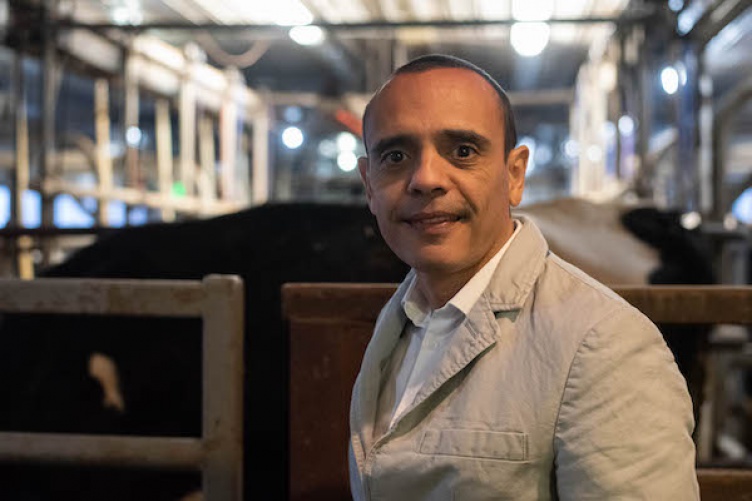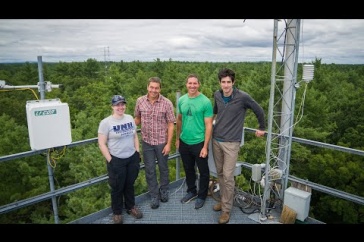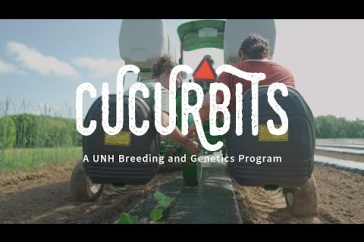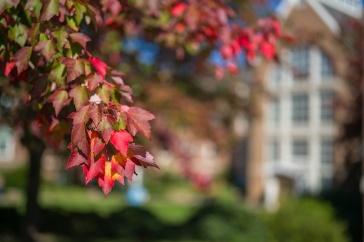
Editor's Note: This is the latest installment in a series featuring UNH faculty telling their stories in their own words.
André Brito, associate professor, agriculture, nutrition and food systems
“I’m from Brazil. My family had a farm for over 40 years, but we didn’t live there; we lived in the city and my father hired someone to take care of the farm. Both my parents were accountants. My father bought the farm as an investment when I was two or three years old. He grew cotton and always had a 200-plus herd of beef cattle. Ever since I can remember, I wanted to be involved with agriculture and animals. I’ve always had a connection with animals — I got them for my birthday: a lamb, dogs, birds. There was a time when I thought I’d be a veterinarian.
My family had the means to send me to a private high school so when I was 15, I went to a school almost 300 miles away from my hometown in Belo Horizonte, Minas Gerais state. I lived with my aunt and uncle and only went home for vacations and holidays. Eventually, I rented a room in an apartment and lived there almost three years.
When I finished high school, I went to the Federal University of Minas Gerais and got my B.S in veterinary medicine and then my master’s in animal nutrition. By then I knew I didn’t want to work as a vet; I was more interested in the academic side of things.
In the fall of 1999, I came to the U.S., to the University of Wisconsin, for my Ph.D. in dairy science. After that, I went back to Brazil. My goal was to be a professor. I went to my hometown and was waiting to get word on where I could do my post doc. I got a temporary job as a lecturer at a federal institute for agriculture and taught for five or six months. Then I moved to another state and worked in the animal science department at the Federal University of Viçosa.
I’d been there about six months when I was contacted by a researcher from at the Dairy and Swine Research and Development Centre in Lennoxville, Quebec, and offered a three-year post-doc position. I told them I was interested but that I couldn’t go right away. Internally, I wasn’t feeling it a hundred percent. They told me I could wait until October and I said that I couldn’t leave until January. They said they’d wait. I knew I’d have to make a decision.
Time passed; October, November. Finally, I told my parents I was going to quit Viçosa and move to Canada. It was a big, big time for me. I knew if I went, I probably wouldn’t come back to work in Brazil for a long time. It was a big move. Things were booming in Brazil at the time. If I left, I knew I’d lose job opportunities. And I had friends there, and my family. I was so torn; I was at the airport, in the terminal and still thought about not going.
I arrived in Lennoxville, Quebec, in January. It was shocking; it had been summer in Brazil when I left. For about a week, it was tough. I think all that decision-making stress caught up with me. Then, a month or so went by, and I started getting comfortable. I made friends. I spent three and a half years as a post–doctorate fellow in Canada, and I kept my eyes open for academia positions in Canada, the U.S. and overseas.
I got an offer for a government position in Australia at the same time I got the offer here. I got hired at UNH in 2009. Since then I’ve become a naturalized citizen. I had a green card, but I wanted to be able to vote in federal elections and fully experience the American way of life and values.
When you’re from one place, and then you live in another for a long time, you lose your identity a little bit. I started to feel like I fit here and not in Brazil. But here, personal relationships are different. They don’t have the same rhythm. Brazilians are friendlier and warm because of the Latin culture. Yet today, if conditions were the same in both places, I would stay here and only go back to Brazil to visit.
I feel much safer here. The first few days when I go home, I don’t feel safe even though I know how things work there. When I was growing up, I always felt safe but now, there is a huge gap between the rich and the poor in Brazil. Before, I always took the bus in the city and my hometown was very safe; we didn’t lock our doors. Now, there are walls; electric fences; bars on windows. You didn’t see that when I was a kid. It’s better here. It’s about life quality.
Brito, a researcher with the NH Agricultural Experiment Station, teaches courses in animal science, animal nutrition and doctoral and dissertation research.
-
Written By:
Jody Record ’95 | Communications and Public Affairs | jody.record@unh.edu



















































